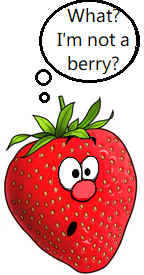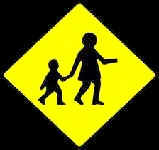| |
Crazy English
by Leon
Crazy
English Vocabulary
| CRAZY WORD OR EXPRESSION |
EXPLANATION
Making sense of the heretofore
UN-explained
|
| Fruits
& Vegetables |
VEGETABLE (definition)
1(a) [Out-dated definition] a plant; herb.
[Nowadays, we say, "Plant"]
2(a) a plant which is grown for the edible parts.
2(b) [Modern English] the edible parts of
plants.
[Source: Merriam Webster's online dictionary]
FRUIT (definition)
1(a) a product of plant growth (as grain, vegetables, or cotton)
Example: "the fruits of the
field"
1(b) (1) : the usually edible
(not always edible) reproductive body of a seed plant
(2) : a product of fertilization in a plant; specifically :
the ripened ovary of a seed plant
2(c) [metaphorically]
offspring, progeny
[Source: Merriam Webster's online dictionary]
Let's look at some examples:
| Vegetables |
NOT
Vegetables |
Roots
(and tubers) |
Stems
(and stalks) |
Leaves
(and flowers) |
Fruits
(seed-bearing part)
(edible) |
Fruits
(seed-bearing part)
(not edible) |
| Potatoes |
Celery |
Lettuce |
Tomatoes |
Rose Hips |
| Carrots |
Rhubarb |
Cabbage |
Bell Peppers |
Gourds |
| Onion (bulbs) |
Green onion
stalks |
Broccoli |
Beans |
Osage Orange |
| Ginger |
? |
Cauliflower |
Corn |
Yew Berries |
| Peanuts |
? |
Spinach |
Rice |
Holly Berries |
| Turnips |
turnip stalks |
turnip greens |
Almonds |
Ivy Berries |
| Beets |
? |
sesame leaves |
Cashews |
Nightshade Berries |
Some fruits are vegetables (because they are edible).
However, some fruits are NOT vegetables (because they're not edible).
I have often had debates with people about whether a tomato
is a fruit or a vegetable. According to Merriam-Webster's
Dictionary, tomatoes are BOTH a fruit AND a vegetable.
|
| Strawberry is not
a berry?!!!

Nope! And, tomatoes are fruits?!!!
|
Correct.
Strawberries are NOT berries and Tomatoes ARE fruits! A berry has its seeds in the middle, surrounded by a
fleshy pulp. See the table below. A tomato is a berry and a strawberry is called an
'aggregate' fruit, because it comes from multiple ovaries to make one
fruit.
| Fruits |
| Berries |
Aggregates |
| Tomatoes |
Strawberries |
| Bananas |
Raspberries |
| Grapes |
Blackberries |
|
|

Free
Clipart
|
Correct.
Peanut is not a nut.
It's a part of the root. True nuts are a kind of
fruit (the seed-bearing part of the plant that comes from the ovaries).
|
herbs
(two meanings)
|
This is another "Latinglish"
word. In Latin, it means 'grass' [and that is 'grass' in the broad
sense, including all grain-bearing plants].
But, in English, it has quite a different meaning. Actually, it
has two meanings:
1. [Archaic] a plant with no woody tissue (this is quite
close to the Latin meaning, but, we don't use this meaning nowadays in
English).
2. [Modern] a plant valued for its medicinal, savory, or
aromatic qualities. (this is the common meaning used by
English-speakers these days).
An "herbivore" is an herb-eating
creature (by the LATIN definition).
|
| plant
|
This is another "Latinglish"
word. In Latin, it is a noun: 'planta' (sole) & a verb: 'plantare'
(to put one's sole on the floor/ground). In English, the verb has
the same meaning, but the noun... Well, it means:
the noun: plant =
(1) any growing
thing that has a cell wall and chlorophyll.
(2) any non-animal, growing thing,
growing out of the ground/soil.
(3) a factory (which
is planted/built on the ground)
I know what you are thinking:
"Where else would one build a factory?" I don't know...
in the sea perhaps, and even then, it might still be called a
'plant'. Who knows? English is a crazy language!
This is a case of polysemy. See my polysemy
page for more details.
|
| embarrass |
This is another confusing
word. It came to English from Latin 'imbarrare' -to-> French
embarasser -to-> English 'embarrass'. em =
"in", and "barra" = bar. Literally, it means
'to bar' or 'to put in bars', but it carries abstract meanings as well,
such as 'to hinder'. In Spanish (embarazar) also means to
impregnate.
In English, it only carries the abstract meaning
of-- making ((sb)) feel confused, mentally frustrated, and/or
self-conscious.
Note: English has a lot of words
"borrowed" from Latin, but English has changed the meaning,
perhaps a case of verbicide.
|
| troop(s) |
This is the craziest word I
have ever seen regarding meaning. A troop is a group of persons,
usually soldiers, and yet it is often used to represent one single
soldier. For example, "There are 37,000 US troops in
Korea" means "There are 37,000 US soldiers in Korea."
But, in the Boy Scouts of America, a troop is a groups
of scouts. Crazy English!
|
Driveway
vs.
Parkway |
We park a car on a driveway.
We drive a car on a parkway.
Crazy English! |
| take |
"Take" means to
physically obtain something (usually something concrete, but can be
something abstract). And yet, it seems to lose its meaning in
various English idioms. See some examples:
take =
obtain concrete thing |
take =
obtain abstract thing |
take =
do |
| take a photo |
take a break |
take a bow |
| "give and take" |
take a chance |
take a look |
| take sb's stuff w/o permission |
take a "crack" at |
take a ride |
| take your medicine |
take a day off |
take a swim |
| - |
take one's time |
take a walk |
| - |
- |
take a whiff |
PHRASAL VERBS w/take
[Note: sb = somebody; sth = something] take
(sb) in = accept someone into one's home
take (sth) in = learn something
take (sb) down = (1) physically bring someone down to the floor;
(2) ruin sb's reputation
take (sb) on = fight sb
take on (sth) = attempt to do something
take off = start to fly
take (sb) out = make sb lose a fight; kill sb
|
| goose/geese
moose/meese? |
If the plural of goose is
geese, why isn't the plural of moose meese? |
bow1
bow2
bow3
bow4
bow5 |
bow /bou/; n. a curve (like
rainbow, or bow & arrow)
bow /bou/; n. a kind of tie (bowtie)
bow /bau/; v. to bend at the waist for an audience at the end of a
performance; n. a bend at the waist
bow /bau/; n. the front part of a boat/ship
bow wow /bau wau/; sound of a dog |
Crazy Spelling / Pronunciation
| silent
"b" |
| -omb |
-umb |
other |
| bomb /bahm/ |
dumb |
debt |
| comb /kohm/ |
thumb |
|
| tomb /toom/ |
|
|
| womb /woom/ |
|
|
|
| buoy
buy |
pronunciation: /bu-i:/
pronunciation: /bai/ |
| ch |
| /
tf / |
/
k / |
/
sh / |
| (Usually pure English, but not
always) |
(Greek English) |
(French English) |
| champion |
ache |
chauffeur |
| cherry |
chemical |
Cheri |
| chick |
chiropractor |
chic |
| chocolate |
chromium |
Chopin |
| chunky |
chronic |
champagne |
| church |
chronometer |
Chicago |
| chapter |
stomach |
crochet |
|
| ea |
| short e sound |
long e sound |
| bread |
bead |
| dead |
eat |
| head |
lead |
| read (past) |
read (present) |
|
| ~et |
| / et / |
/ ei / |
| banquet |
ballet (kind of dance) |
| racquet |
bouquet (bunch of flowers) |
| ticket |
buffet (all-you-can-eat) |
| toilet |
crochet (kind of knitting) |
| widget |
croquet (kind of game) |
|
| ~ew |
| / u: / |
/ ju: / |
| blew (past of blow) |
ewe (female sheep) |
| flew (past of fly) |
few (not many) |
| grew (past of grow) |
pew (a bench in church) |
| new [US] |
new [UK] |
|
| ey |
| / i: / |
/ ei / |
/ ai / |
| honey |
hey |
eye |
| key |
grey |
Eyring |
| money |
whey |
Frey |
|
Finnish
vs
finish |
Finnish (adj) of Finland;
pronunciation: /finish/
finish (v.) to complete (sth); pronunciation: /finish/
The Finnish person did finish the project. |
| silent g |
gnat
gnu
gnosticism |
| ~gh |
| silent
gh |
/ f / |
/ p / |
| eight |
enough |
hiccough |
| right |
rough |
x |
| though |
tough |
x |
| bough (branch) |
laugh |
x |
|
| silent
"k" |
knife
knight
knock
know |
| silent
"l" |
talk
walk |
| ~o |
do, to
What?!!!!! "o" sounds like "oo"??????
Why? |
| ~oe |
shoe
= /shu:/
toe = /tou/
What the...? |
| ~omb |
Bomb
/bam/
Comb /koum/
Tomb /tu:m/ Womb
/wu:m/
Truly crazy pronunciation of English! |
| one
two
four
|
one /w n/ n/
This is one of the craziest
words regarding pronunciation. I remember when I was in primary
school and I was learning how to spell. One day I was writing a
letter and I asked my mother how to spell "1". She said,
"O-N-E." I wrote it down, then I said, "Mom, come
on! Don't trick me, Mom." She said, "No, really, that's how
it is spelled." I asked, "Why?" She said that
she didn't know. I remember thinking, "That is stupid!"
two /tu:/
Why? Well, to and too had already been taken, but
why not "tu"? I don't know. See my homophones
page.
four /for/
Why? Well, for had already been taken, but they could have
made a homonym. Why not? I don't know. See my homonyms
page.
|
| ~oo |
 |
 |
 |
_
o
|
| book |
boot |
blood |
brooch |
| good |
food |
flood |
door |
| stood |
mood |
x |
floor |
| took |
toot |
x |
Moor |
Crazy English Pronunciation! |
| silent
"p" |
receipt
psychology |
Polish
vs
polish |
Polish (adj) of Poland;
pronunciation: /polish/
polish (v.) to make (sth) shiny; pronunciation:
/palish/
A Polish person can polish his/her shoes. |
| sew |
sew = /sou/ |
| s / ss |
| /s/ |
/sh/ |
/zh/ |
/z/ |
| ass |
issue |
Asia |
as |
| mass |
nauseous |
casual |
because |
| pass |
sugar |
pleasure |
clause |
| sailing |
sure |
usual |
is |
| wassailing |
tissue |
vision |
was |
|
| silent s |
island, aisle |
| silent t |
listen, castle, whistle, wrestle, fasten,
often |
| ~ue, ~ueue |
cue /kyu/ = (1) a thing said or done to
signal somebody to do something
(2) a wooden rod for striking a ball in billiards or pool
queue /kyu/ = (1) a line of people; (2) to make a line of people
suede /sweid/ = rough cow hide (not smooth leather) |
| ~uit |
fruit /fru:t/
suit /su:t/
suite /sweet/ |
| silent
"w" |
answer
wreck
wren
wrestle
write, wrote, written
wrong |
warm
vs
worm |
Why is "warm"
pronounced like "worm" and why is "worm" pronounced
like "wyrm"?
I think it is because "worm" was originally
spelt "wyrm", but I could be wrong.
|
wind
vs
wind |
wind /wind/ = breeze, a gust
of air
wind /waind/ = to turn something, usually something
which will turn back automatically |
| |

English |
|

Spanish
|

Korean |

Mongolian |

Chinese |
|

Parents of
Homeschool
|
|

Halloween
|
|

Thanksgiving
|
|

Winter Solstice
|
|

Christmas
|
|

New Years
|
|

Chinese Lunar
New Year
|
|

Valentine's
|
|

|
|

Easter
|
|

All About
Dr. Seuss
|
|

Roald Dahl
|
|

Prepper's
Pen |
|

Ways to
Help
Leon's Planet
|
|